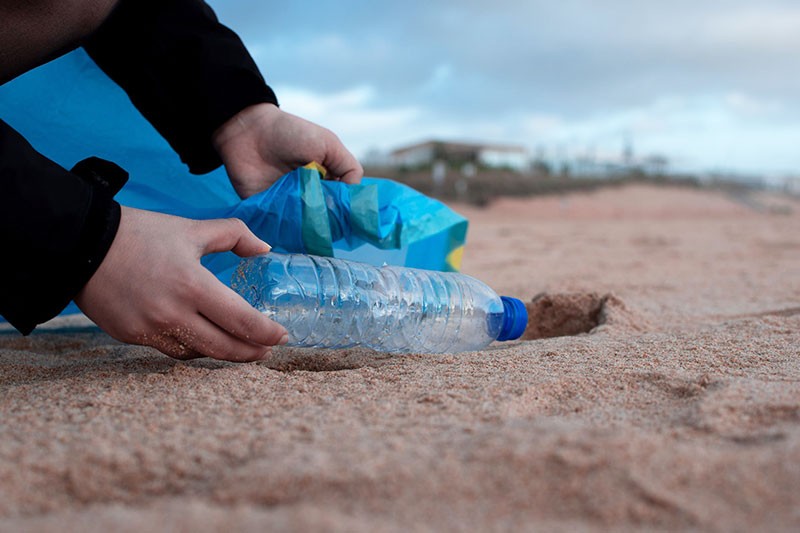What Is Environmental Awareness And Why Is It Important? If you're asking yourself this question right now, you've come to the right place! Finally, the topic of environmental awareness is moving more and more into the focus of media attention. Besides regular debates about the climate change, the Air quality in the cities or the pollution of the oceans by plastic waste, it was also environmental movements such as Fridays for Futurewhich impressively demonstrated how pronounced environmental awareness is in our society and especially among young people.
But what is environmental awareness actually from a psychological point of view, how do a person's closeness to nature and his or her behavior relate to each other, and how can one improve one's own awareness of nature?
In this article, I would like to answer this very question and make the concept of environmental awareness more tangible. Let's go!
What Is Environmental Awareness And Why Is It Important?
According to dictionaries, environmental awareness is composed of the Environmental Knowledge, the Environmental settings, the Behavioral Intentions regarding the environment and the actual environmental behavior of a human being.₁
Simply explained you can say: Environmental awareness is a person's realization that their natural environment is of great importance to all life on Earth - and that their everyday actions have an impact on it.
Environmentally conscious people know that by directly or indirectly damaging the environment, they are not only damaging sensitive ecosystems but also also endanger their own livelihood - and accordingly opt for the more environmentally friendly behavior.
Man and Environment - An Eternal Relationship

For thousands of years in the history of man's development, nature was Food supplier as well as existential threat at the same time.
Already the construction of the first house had the Sense of protection from the immediate, hostile environment. The technical possibilities of being able to protect and assert oneself against nature grew over the millennia.
At the same time, man's self-confidence in his ability to dominate, control and change nature grew. This development culminated in the industrial revolution, which ushered in an unprecedented era of man-made environmental disasters the likes of which the world had never seen before. In the 19th century in particular, it was a guiding political principle, to want to subjugate natureThis was evident, for example, in the numerous straightening and draining of rivers, which have left massive permanent damage to this day.
In recent decades, however, environmental awareness has increased more and more, and it is now accepted, at least politically and socially, to value environmental protection as important. This was also shown by the Environmental Awareness Study for the year 2022, which was published by the Federal Environment Agency in August 2023.
According to the survey count 57 percent of participants consider environmental and climate protection to be the most important social challenges. In addition, a large majority feels that important players such as the federal government and industry are not doing enough to protect the environment and climate.
Tip: Be sure to check out the Tips for climate protection in everyday life if you yourself, with simple means, can be a part of the solution in the fight against the global warming would like to become.
Environmental awareness and behavior
Yet there is a big gap between what people say about environmental awareness and how they actually behave. In many cases, one can even speak of the complete opposite. One example: Over 70 percent of Germans would like to travel more sustainably - yet only 7 percent actually put this into practice.₂
The plane is despite cheaper and environmentally friendly alternatives, meat is still the preferred mode of transport. Meat is despite more environmentally friendly, healthier and higher-quality substitute products on the plates of many. And that everything despite lasting feelings of shame like the "Flight shame" or the "Meat shame".
But what are the psychological reasons for this discrepancy? Why do so many people obviously have a high level of environmental awareness, but do not implement this in their everyday lives? The motives for this are manifold. In the following I would like to introduce you to four of them.
1. low cost effect
The low-cost effect in psychology states that people are especially willing to change their behavior if they can do so in exchange for have to do without much and the change involves as little additional time, organizational and financial effort for them as possible.
One example is the climate friendly mobility: While for city dwellers the switch from car to public transport, bicycle or scooter is often straightforward, rural dwellers often have no other option than to drive to get from A to B.
Another example are Organic foodwhich are often more expensive than conventional foods and thus far from affordable for all people.
2. social desirability
The psychological effect of social desirability is a well-known bias in research and evaluation and regularly causes flawed study results. It states that people tend to behave in a way that they consider to be a socially desirable norm.
The protection of nature is such a norm, To speak out against it would be controversial. This is why it is to be expected that study participants will also support environmental protection in surveys. Even if it does not correspond to their personal opinion. In most cases, the participants are not even aware of the effect.
Tip: If you could use some more inspiration and motivation to target your environmental awareness, be sure to check out the Quotes Collection With Sayings About Change.
3. the power of habit
How difficult changes often are to implementhas already been discussed in another article. In the case of environmental awareness, too, it is in many cases simply the power of habit that Prevents people from adapting their behavior according to their own environmental awareness.
This is the case, for example, if you forget to regularly turn off the heat, put food in unnecessary plastic packaging or once again travels a very short distance by car.
4. self-efficacy expectation
Self-efficacy plays a key role in psychological behavioral research. It denotes the Expectation of a person to be able to perform an action successfully by himself/herself by means of his/her own competencies.. Simply put, this means that people who believe they can make a difference themselves have a high self-efficacy expectation.
This also plays a major role in terms of environmentally conscious behavior. After all, many people are of the Conviction of not being able to do anything themselves for general environmental awareness. Instead, politics and the economy tend to be blamed.
Now, in the next section, you'll learn how to live an environmentally conscious life, both in your own everyday life and on a societal level.
Promote environmental awareness
At the same time, the question of improving environmental awareness raises the question of who is responsible for environmental awareness is and who is able to actually do something for the environment.
We have already seen that people often find it difficult to lead an environmentally conscious everyday life for many psychological reasons. This has also been recognized in politics. In recent years, there has been an increasing shift away from an "individual policy" approach to convincing people of the urgency of protecting the environment and toward the use of economic measures instead.
With the corresponding instruments, environmentally friendly behavior is rewarded with economic added value. This makes it more attractive for many people to actually comply. Incentives for more environmentally friendly behavior supply for example Grants for energy-saving lamps or Emission allowances.
Especially for companies Positive economic incentives increase the acceptance of nature conservation measures. No wonder, because as soon as money can be earned with nature conservation, the preservation and promotion of the environment is integrated into the economic calculation and from a possible obstacle to an additional economic opportunity.
For example, the world's largest financial manager Blackrock also announced at the beginning of 2020 that it would in future value companies according to climate risks and partially eliminate companies that mine coal from its portfolios. A sign that points to a positive development suggests.
Politics and business thus create framework conditions that integrate environmental protection into people's everyday lives and the reality of their lives. Ultimately, however, it is up to each individual, to bring one's own everyday life into harmony with environmental protection.
Tip: If you want to know how to Promoting environmental awareness in a targeted manner can - for example, in childhood - then be sure to check out the linked article.
How everyone can live environmentally conscious

In order to improve one's own environmental awareness, it can be helpful to consider the interrelationships that "keep our planet running."
How are CO2 emissions from a single car related to general global warming? Where does the plastic bag in the supermarket come from and where does it end up after being thrown away? To question things and be curious, generates understanding and greater awareness. It can also be helpful to plant something yourself to regain an appreciation for the biological cycles.
In addition, the following, further articles promote your environmental awareness:
- Environmental problems of our time
- Relationship diet and environment
- Docs about factory farming
- Reasons for plant-based diet
- Garden sustainable design - Tips & Tricks
- Environmental protection with children
- Zero Waste for beginners
- Sustainable driving
- Living plastic-free - Here's how
- Protecting the environment in everyday life
Tip: Feel free to look around even more in the Environmental protection blog um! There you will find a cornucopia of inspiration for a more environmentally conscious everyday life.
Through your own actions - even if they are only small changes - you can serve as a positive example to others. However, one should be careful not to want to instruct other people with a raised forefinger.. Rather, the focus should be on having fun with an environmentally conscious lifestyle. It should be fun to show that environmentally conscious action and the more minimalist life also means more connectedness and joie de vivre.
In addition, you can also be involved in associations or Create petitions and thus also strive for change at the political level.
Environmental awareness is important - especially for our future
For a long time, we as humans were at the mercy of nature. For several hundred years, we have had technical possibilities, To be able to dominate and control nature. At least to a certain extent.
In the process, we often forget that we ourselves are part of the nature and we are faced with its destruction. also our deprive one's livelihood.
An intact environment with clear water, clean air, healthy soils and a diversity of animal and plant species is vital to our well-being and quality of life. Only nature itself probably doesn't care at all if we humans exist. It would continue to exist even without us.
"We are living in dangerous times. Men control nature before they are even able to control themselves."
Albert Schweitzer (more at Sustainability Quotes)
Fortunately, our responsibility on the planet is being recognized more and more in many countries and is being translated into political and social action. It remains to be hoped that the rest of the world will also follow suit and that imminent, long-term damage and catastrophes can be avoided. Until then, it is up to each individual to do something and get involved.
Do you have questions, suggestions, or your own definition of environmental awareness that you'd like to share? Then I look forward to your contribution.
Stay environmentally friendly,

PS: In the article about the sustainable lifestyle you will directly get a big list of simple tips for more environmental protection, which you can implement step by step.
References:
₁ E. Günther; Springer Gabler: Umweltbewusstsein, available at https://t1p.de/8lc9 [25.09.2023].
₂ Norddeutscher Rundfunk; Tagesschau: #kurzerklärt: Nachhaltiges Reisen - wie geht das?. YouTube, 28 Jun. 2019, Web, 25 Sep. 2023 at 21:53, in: https://www.youtube.com/watch?v=_ey0VzJqI8Y.








